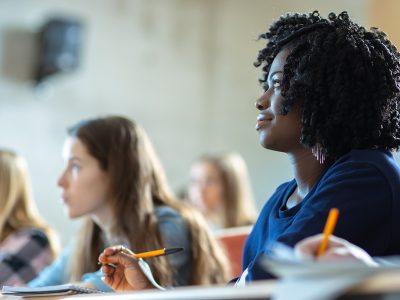By Dan Rubinstein
Sarita Cuadros Sanchez, a third-year Biology student at Carleton University, was scheduled for a major end-of-term presentation last week in her advanced microbiology class.
She was nervous. It’s worth 40 per cent of her final mark.
So when Carleton announced a shift to online course delivery and other alternative modes of teaching and learning — as part of a national effort to slow the spread of COVID-19 — Cuadros Sanchez and Prof. Ashkan Golshani came up with a plan. She would do the presentation from home using an online video and screen-sharing platform, with her classmates invited to watch and ask questions remotely.
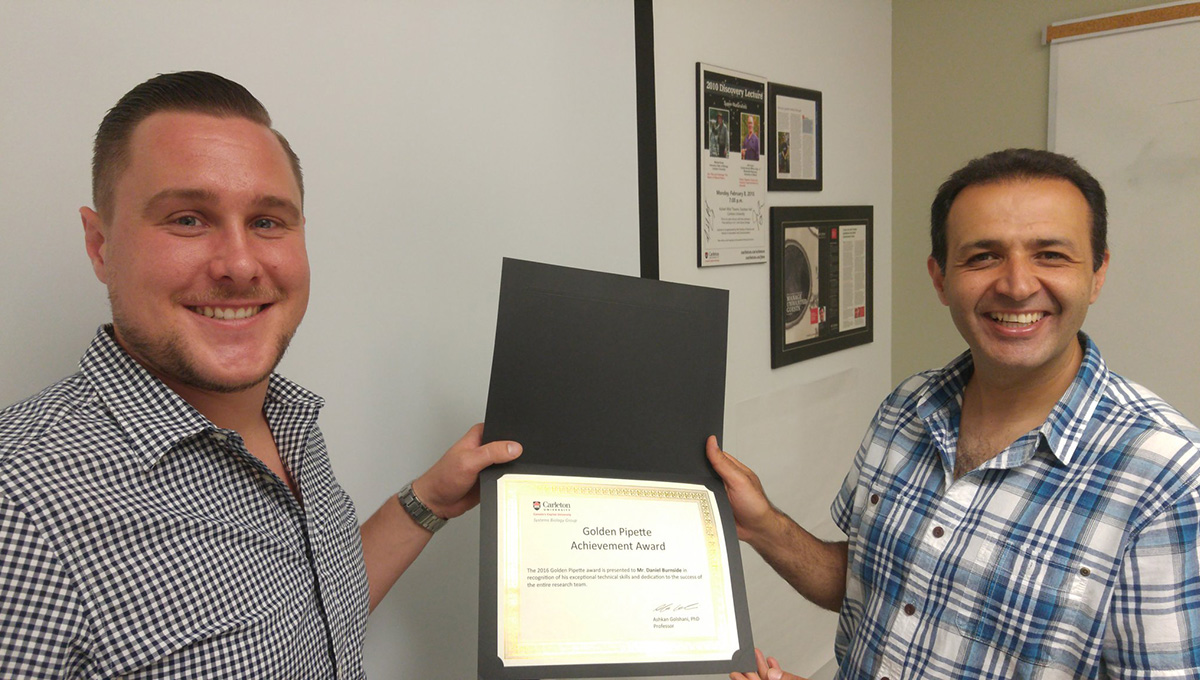
Prof. Ashkan Golshani (right) presents an award to a student in 2016
“Everything went really smoothly,” says Cuadros Sanchez, whose presentation happened to focus on protein-to-protein interactions and COVID-19, a topic she choose two months ago when Golshani asked students to propose relevant research projects in understudied areas. “It lasted for almost an hour and there were lots of questions and a really good discussion at the end.
“I’m amazed by how fast and how well my transition to online is going,” she continues, explaining that two of her other courses now revolve around uploaded digital lectures, and that she’ll be making a poster instead of doing a presentation as the final project in a lab-based course for which the hands-on experiments were already completed.
“It feels good that our professors are here to support us no matter what,” says Cuadros Sanchez. “That’s really important at a time like this.
“Everything is changing quickly, but we’re all learning and adjusting. We are one community and we all want to make the situation better. And it’s important to have something to focus on, instead of just sitting at home and worrying.”
Cuadros Sanchez’s experience is by no means unique.
Over the past week, as Carleton responded to an unprecedented global health crisis, faculty and staff have demonstrated a commitment to being compassionate and flexible with students — and to keeping the university’s core academic mission on track.
“The past week has seen absolutely unprecedented change come to our campus,” Carleton President Benoit-Antoine Bacon told the community last Friday, “and the way that our entire community has reacted to this rapidly evolving, stressful situation has been nothing short of phenomenal.”
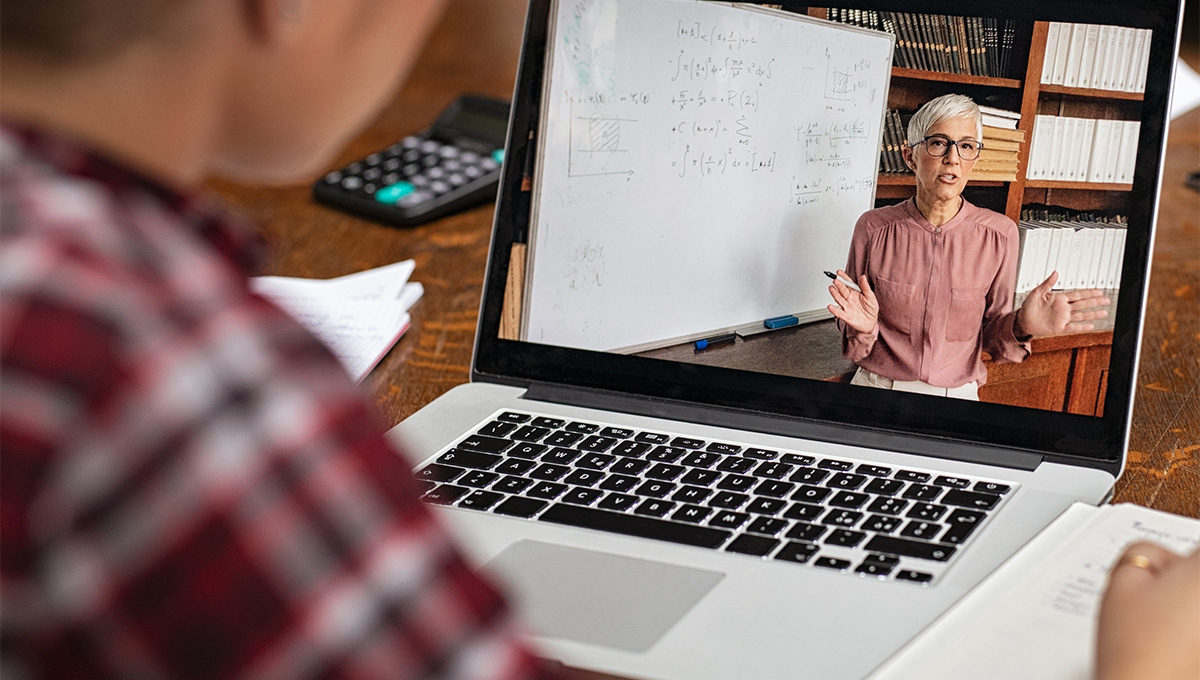
Reassurance for Students is Key
For Prof. Stephanie Carvin, an international relations scholar at Carleton’s Norman Paterson School of International Affairs, one of the top priorities when corresponding and talking with students is reassurance.
“They take their grades seriously and worry about normal things such as getting assignments finished on time,” she says. “That can be stressful at the best of times. Then something like COVID-19 emerges.”
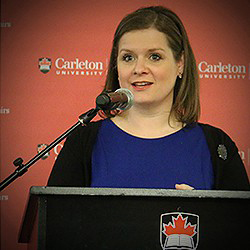
Prof. Stephanie Carvin
The first thing that Carvin emphasizes in emails to students is that they won’t be penalized amid all this uncertainty. She also promises to take their individual circumstances into consideration when she’s grading, consults them before deciding how to redistribute marks when quizzes are cancelled, and shares links to counselling services and other wellness supports.
In a graduate seminar she’s teaching this semester, Carvin gave students three options for their final presentations: they could record and upload video/PowerPoint presentations; they could do presentations live to her using the Zoom platform; or they could do it live for the whole class using Zoom. Moreover, if any student had limited access to high-speed Internet, they could reach out to her privately with their concerns.
Carvin concedes she has an advantage over some faculty — since 2017, she has produced and hosted a podcast on Canadian national security law and policy with a collaborator at the University of Ottawa, and she’s already adept at using platforms such as a Zoom, Kaltura and BigBlueButton. She has also held online office hours before.
“Our students live online and are used to being connected all the time,” she says, “so this is probably more of an adjustment for some professors.”
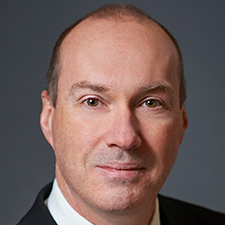
Prof. Craig Forcese
To ease the transition, Carvin and Prof. Craig Forcese’s Intrepid podcast recently released an episode dedicated to helping their academic colleagues convert their courses to online delivery on very short notice.
Among their tips are to not simply record an hour-long lecture but to structure the material into a series of shorter segments.
“We can all learn from this,” says Carvin, “and there could be opportunities to figure out how to incorporate new technologies into our classes going forward.”

Profs Are Learning New Technologies Quickly
Neuroscience Prof. Alfonso Abizaid is one of the older-school faculty members who has had to learn new technologies on the fly.
It’s been easy to adapt the PhD-level seminar he’s teaching since it involves just a few people. Meetings and presentations can continue on platforms such as Zoom.
For his third-year Neuroscience class on hormones and how they influence the brain to modify behaviour, Abizaid has been recording video lectures for the 100 or so students.
“I’m not a technology expert, but even I can use these tools fairly easily,” he says, adding that he’s test driving material with his teaching assistants and asking for feedback from students so he can refine his approach in the days, weeks, and possibly months ahead.
Abizaid is also trying to be as flexible and compassionate as possible with students.
“Your year is not in jeopardy, your graduation is not in jeopardy,” he tells them. “We’ll work through this together. Whatever it takes. Even if I have to learn how to code.”
Thanks to Carleton’s Teaching and Learning Services (TLS) unit — whom Abizaid calls “the real heroes” — and portals such as cuLearn, professors and students have a wide spectrum of digital options and support.
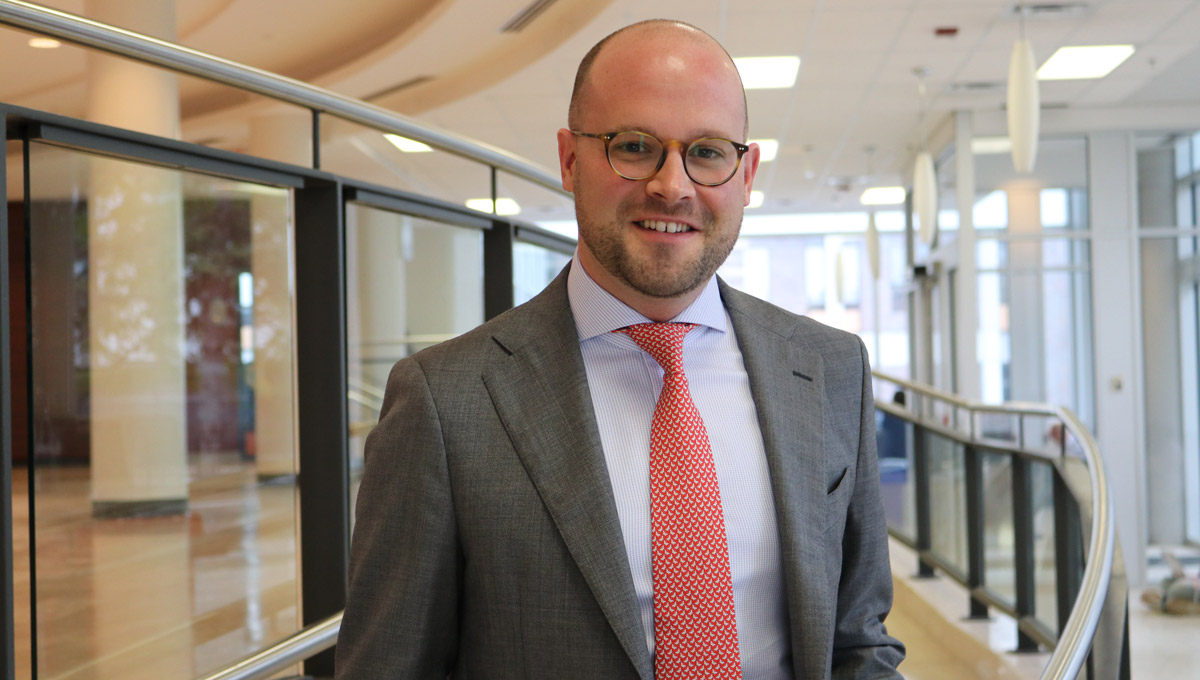
Professor of International Affairs and the Associate Vice-President (Teaching and Learning) David J. Hornsby
David Hornsby, the university’s associate vice-president (Teaching and Learning), who oversees about five dozen staff in areas such as the Educational Development Centre and Instructional Media Services, is quick to praise his colleagues and Carleton’s proactive approach.
With around 80 per cent of classes already incorporating cuLearn for some of their material before the crisis, TLS was able to quickly develop and share resources to support the pivot to everything going online. That entailed providing tools to help people upload or access content, ensuring there was enough bandwidth, replying rapidly to phone and email questions, and sharing advice in areas such as how to study effectively online and how to keep on teaching.
“This is a not a complete rethink of our courses but a triage moment,” says Hornsby, who shared his expertise as a guest on the Intrepid podcast.
“I’m incredibly proud of my colleagues. I’ve always felt confident in their professionalism. But this shows that Carleton is a leader in teaching and learning across Canada.
“Our faculty and staff are really committed to our students and our academic mission,” he continues, “and this was clearly apparent throughout the past week. Their commitment to knowledge and to student success will carry classes through to the successful completion of the term.”

New Ways of Assessing Students
For some faculty at Carleton, such as Political Science Prof. Jonathan Malloy, navigating the change to online teaching has led to valuable reflection and revision.
“I’m still figuring out how to teach what still needs to be learned and how to do it,” he said on Twitter. “But it’s allowing me to focus even more on the objectives, not ‘I guess you guys need to know this’ content. And to experiment with new ways of delivery, which is (almost) fun.”
For others, such as Mechanical and Aerospace Engineering Prof. Jeremy Laliberté, who is juggling an undergraduate course with 120 students, a graduate course, students doing their major fourth-year capstone projects and the thesis graduate students he’s supervising, the focus has been on shifting to online teaching and figuring out alternatives to in-person final exams and other assessments, with research projects on the backburner for now.
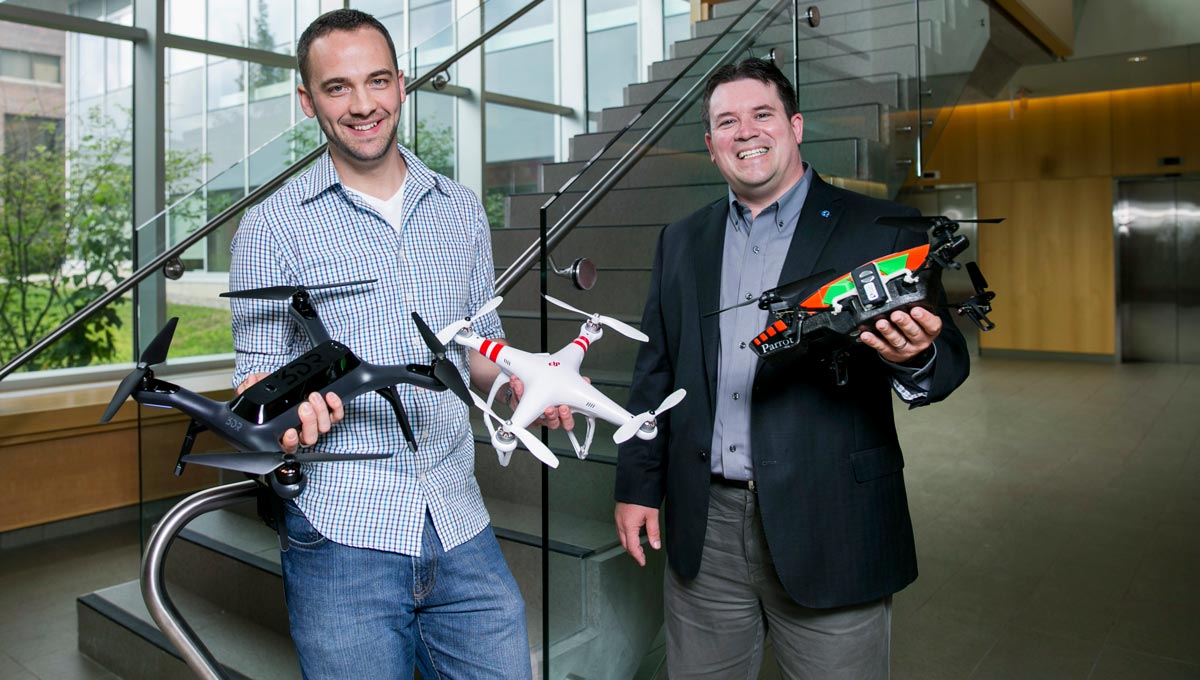
Jeremy Laliberté (right), director of Carleton Aerospace and associate professor in the Department of Mechanical and Aerospace Engineering
When Laliberté records lectures, which he’s doing in 20-minute segments using slides and virtual whiteboards in addition to video, he can pause and edit content — something you can’t do live in front of a class.
Thankfully, it’s near the end of the term, says Laliberté, so most of the hands-on work has been completed and most of the data students need for presentations and projects has been collected.
“This is a big test for all of us,” he says, “and the key for me has been flexibility.”
Food Science instructor Martha Healey reports that the first class she taught last week using BigBlueButton passed the test with flying colours.
“Every student showed up (at 8:35 a.m. no less) and was fully engaged,” she wrote in an email.
“The class ran right to full time. The students muted/unmuted themselves and we kept an eye on the public chat for the one person who didn’t have a microphone.
“The students all participated throughout the class. When we took our usual break (it is a three-hour lecture), a number of my students turned on their webcams, introduced their pets and just talked to each other. It was fantastic.”
Beyond these examples of individual effort and success, Carleton is constantly offering support, including a series of online training workshops on digital tools, and planning ahead to offer all summer courses online or through distance learning, with registration delayed to mid-April.
“There’s a sense of normalcy that remains because of all the work of staff and professors,” says fourth-year Linguistics student Talia Tahtadjian. “I’ve been really impressed. I’m getting frequent and clear communication from everybody and so far the transition has been seamless.”

Monday, March 23, 2020 in Student Experience, Teaching and Learning, Technology
Share: Twitter, Facebook

